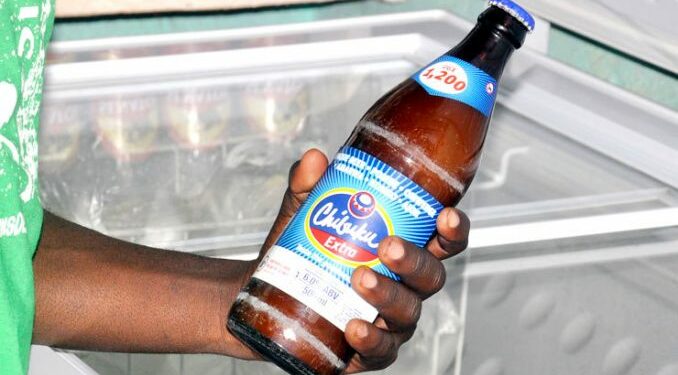Factories producing the low cost opaque beer will in the new Financial Year 2022/2023 enjoy a tax relief intended to attract more local manufacturers into the alcohol production industry.
Manufacturers of opaque beer will effective 01 July 2022 pay 12 per cent or Shs150 per litre of the beer produced as compared to the current 20 per cent or Shs230 per litre.
This is after the House on Wednesday, 18 May 2022 passed the Excise Duty (Amendment) Bill, 2022 whose object is to amend the Excise Duty Act, 2014, to provide for the definition of “fruit juice”, “un-denatured spirits” and “vegetable juice” and other related matters.
Opaque beers are locally sourced and manufactured beers using a low cost industrial process. An example of opaque beer includes Chibuku, a local brew that was produced by Nile Breweries Limited (NBL) until 2018.
The Chairperson of the Committee on Finance, Hon. Keefa Kiwanuka, told the House that the proposal to reduce the excise duty rate on opaque beer would encourage the reopening of companies that had closed as a consequence of the higher tax.
In Financial Year 2020/2021, companies were paying 30 per cent or Shs650 per litre in excise tax before the Act was amended in Financial Year 2021/2022 to reduce it to the current 20 per cent or Shs230 per litre.
“The unprogressive tax on opaque beer rendered Chibuku uncompetitive with other local brews such as tonto, ajono, mulamba, malwa, kwete among others. Due to this, annual VAT worth Shs5 billion was lost, an average of 3.6 million Kilogrammes of locally grown maize, over 1,000 farmers supplying maize lost market, 6,000 direct and indirect jobs linked to the factories were lost,” Hon. Kiwanuka said.
The committee had proposed that the excise duty rate be reduced to 10 per cent or Shs100 per litre to optimise business, but the House rejected the proposal and settled for 12 per cent or Shs150 per litre on grounds that beer is a non-essential product which should be maximally taxed.
“What is the impact of reducing the tax on non-essential goods? Beer is a luxury. So we should not be intimidated that voters are watching yet the same voters want hospitals, security and roads,” Speaker Anita Among said.
Kalungu West County MP, Joseph Ssewungu, opposed the reduction of taxes on opaque beer opining that it was biased towards benefiting multinational companies.
“The proposal is solely aimed at facilitating NBL to resume production of Chibuku and this disadvantages other people who are producing their local brew. Consequently, government seems to be held hostage by the multinational companies against their own local companies,” Ssewungu said.
Bukooli Central MP, Solomon Silwany, who equally opposed the reduction, said that beers are inelastic products whose consumption cannot be affected by the price.
Sheema Municipality MP, Hon. Dicksons Kateshumbwa supported government’s proposal to reduce the tax to Shs150 per litre saying it is sufficient.
“This appetite of reducing taxes without understanding that it has an implication on what we shall discuss later is dangerous. A reduction from Shs150 to Shs100 will have consequences as we allocate the surplus. The Shs150 or 12 per cent that has been provided is sufficient,” Kateshumbwa said.
The House also rejected proposed increase on excise duty on bags of polymers of ethylene and other plastics to 40 per cent or Shs4,000, but voted to reduce tax on un-denatured alcoholic spirits made from imported raw materials from the proposed Shs2,500 per litre to Shs2,000 per litre.
The new amendment will also see alcoholic kombucha drinks producers pay a lower tax of 12 per cent or Shs150 per litre as compared to the current 20 per cent or Shs250. This is aimed at encouraging more manufacturers of the alcoholic kombucha to become tax compliant and join the formal sector thereby widening the tax base.
During the debate, Kampala Central Division MP, Hon. Muhammad Nsereko, tabled a minority report that proposed a reduction on excise duty on petrol by Shs750 per litre from the current Shs1,450 per litre and diesel from Shs1,130 per litre to Shs530, to cushion Ugandans from the high cost of living that has been worsened by the skyrocketing fuel prices.
The House, however, rejected Nsereko’s dissenting report saying there is no guarantee that reduction of excise duty on fuel would reduce the pump prices.
“This country does not have the competition law; there is monopoly and hoarding so even if we reduce taxes it will not work, fuel operators and importers will continue to make super abnormal profits and pump prices will not reduce until we have the competition law in place,” Tororo North County MP, Hon. Geofrey Ekanya said.
Kateshumbwa, who prior to joining the 11th Parliament was Commissioner for Domestic Taxes at the Uganda Revenue Authority, said that government will lose over Shs1.5trillion in revenue by reducing the excise duty rate on fuel.
Do you have a story in your community or an opinion to share with us: Email us at editorial@watchdoguganda.com










